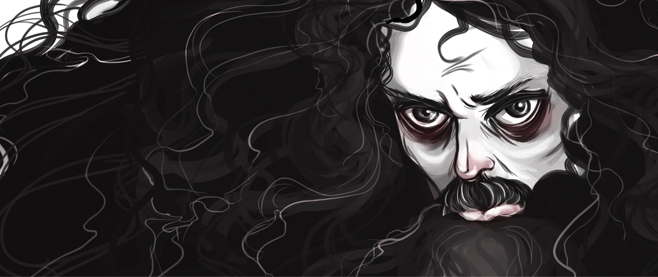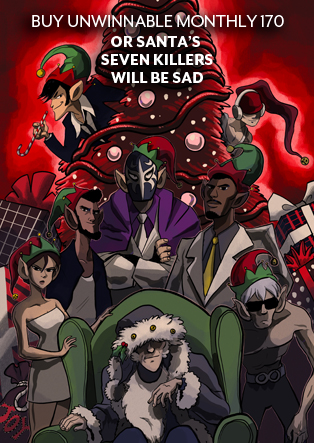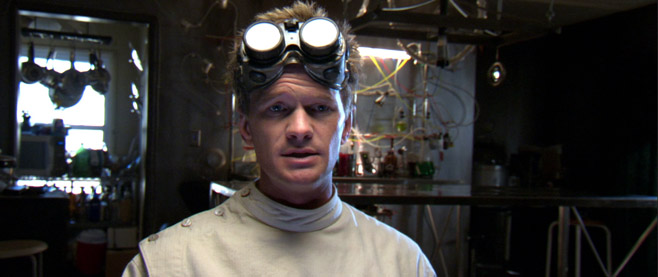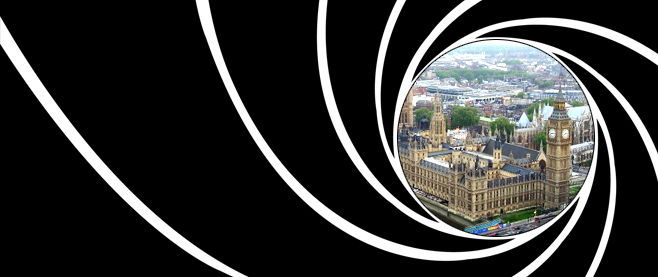
Alan Moore: On Villainy
Long in advance of the whole Before Watchmen kerfuffle, I had the opportunity to interview Alan Moore for the local Brooklyn literary journal, Slice Magazine.
Much like the estimable Unwinnable, Slice is prone to organize content around certain themes. When the editorial team there announced that the theme would be villains, I got a crazy idea in my head that just wouldn’t leave. I could think of no other person in the field of geek entertainment that most seemingly embodied the villainous more than Alan Moore, especially at a time when the Watchmen movie adaptation had come and gone – and had been cursed, literally, magickally cursed, by Moore.
With Moore, you have an outspoken creator who has more or less created the modern mainstream comic industry and who is generally dog-piled with derision and bile every time he opens his mouth. Moore, who has written some of the most complex villains to grace a nine-panel grid, who stalks around Northampton Borough wearing skull rings and his trademark big bastard of a beard, who is extremely outspoken and opinionated, certainly doesn’t go out of his way to not seem nefarious.
Here is an excerpt from my interview with Moore, where we discuss all things villainous:
Unwinnable: The theme…is villains.
Alan Moore: Villains. I can handle villains.
 Unwinnable: People who may not be up to speed on some of the less-than-fair treatment you’ve been made to endure might perceive you as this crabby hermit that surfaces once in a while to yell about the movie industry. There’s always been the intimation that somehow it’s you who’s being petty by not playing ball with the big movie studios and the comic studios. How do you respond to something like that?
Unwinnable: People who may not be up to speed on some of the less-than-fair treatment you’ve been made to endure might perceive you as this crabby hermit that surfaces once in a while to yell about the movie industry. There’s always been the intimation that somehow it’s you who’s being petty by not playing ball with the big movie studios and the comic studios. How do you respond to something like that?
A.M.: I’m pretty much past the point where I even feel that I need to respond. I mean, I simply do not care about the mainstream entertainment industry. It doesn’t really seem to be the kind of place where I am comfortable working, or where I feel that my work is best represented. This is pretty much up to me and I’ve never demanded that of my collaborators.
For example, with Lost Girls; my position was that, no, I didn’t want my name upon any film that was made of any of my work and I didn’t want any money from it. I would give that to my collaborator. I was completely genuine about that. I didn’t want to compel anybody else to do what I was doing and I would have the greatest of respect for their position. Melinda [Gebbie] did get offered a chance to do an animated version of Lost Girls and Melinda comes from a background and culture where, to have a movie made of your work is pretty much the peak experience, the apex that everybody is longing for. Melinda thought about it for three or four days, and she got quite anguished about it. I think she only told me when she had decided that a film of Lost Girls would probably be horrible and it would be a betrayal of the effort and the energy that we’d put into the book.
It was nothing that I would have ever expected and I obviously wouldn’t have thought any the less of Melinda if she’d decided to take the opposite route.
The reason that I have explained my position, perhaps in a cranky way, is because people have asked me. These are things that I really don’t want to be associated with. So, I’m getting on with the projects that I am interested in; they’re coming out from a publisher that I do respect.
Unwinnable: Your American publisher is Top Shelf?
A.M.: That’s right. Top Shelf conducts business in a completely gentlemanly fashion. They’ve been straightforward and honest in all of their dealings with us. If people think that I’m cranky and cantankerous, they really should get introduced to Kevin O’Neill sometime. Kevin is a spitting ball of fury that is quite the equal of my own, and he’s getting on fine with Top Shelf. That’s the mark of a decent publisher: if Kevin O’Neill doesn’t hate them and isn’t planning some terrible revenge, then they’re probably okay.

Unwinnable: Who, in your works, do you consider your ultimate villain?
A.M.: Well, probably in terms of my favorite character of a villainous nature, I would say that it would be William Gull. William Gull in From Hell. That is probably one of the most complex portraits of a supposedly evil character that I think I’ve ever attempted. I was probably quite unbearable while I was writing some of those later chapters, because you do tend to take on the coloration of what you’re writing about. I do enjoy writing villains, not because I’m particularly villainous myself, but purely because I find that they often have a more interesting and complex makeup than heroes who are very often incredibly simplistic and unrealistic. With a good villain it’s always been my policy, in writing an unsympathetic character, to try and sympathize with them.
I think ever since I was writing V for Vendetta, it occurred to me that there’s nobody in the history of the world who has ever thought of themselves as a villain. I mean most supervillains, they give themselves names like Doctor Evil or something like that. I doubt that anybody has ever thought, “Yes, I’m evil and I enjoy it.” Most people, I’m sure even Hitler, were heroes in their own mind.
In fact, looked at in that light, the concept of a hero does become quite a dangerous one. When you remember that Hitler was the hero of the German people, they elected him as their Chancellor because he was trying to embody a kind of heroic German myth. He was playing to all of those tendencies in his audience. The concept of heroes can be one that is questionable and dangerous.
 Unwinnable: V in V for Vendetta could easily be both a hero and villain.
Unwinnable: V in V for Vendetta could easily be both a hero and villain.
A.M.: Well that was why we called the very first chapter The Villain, because I wanted to introduce that ambiguity right from the start. I didn’t want anybody to assume automatically that he was the hero. This was why I questioned the fact that he killed people, because it seemed to me the assumption that if somebody kills somebody in a comic book story and they’re the hero, it’s OK. So I brought in all of the stuff where you’ve got Evey, who wouldn’t kill anybody and is appalled by the fact that V has killed. I wanted to question those automatic assumptions that we tend to make in narratives about how the guy in the white hat, or in this case the black hat, is somehow morally excused all of the considerations that the rest of us must abide by.
During V for Vendetta, even though I am repulsed by fascism, I really tried to make the various people who were part of the fascist government into believable human beings with their different reasons for doing what they did; where there were elements of sympathy in the portrayal of them. I think otherwise you’d have been left with simplistic cartoons that would not have been credible characters and that’s not going to serve your narrative. I think that in our approach to villains, we have to stop seeing things in those terms.
Unwinnable: As a reader, or a viewer, you’re not learning anything about yourself.
A.M.: Your prejudice is concerned. So, the writer is not really doing their job, or at least not if they’ve got any pretensions to being an artist. I think that it’s the job of art to upset people, or at least to force them to reappraise the preconceptions that they may have been guided by.

Want more of Tim Mucci vs. Alan Moore? You can read the rest of the article on Issuu for free or listen to the unabridged audio on Write Club. Special thanks to Slice Magazine to republish the excerpt. Alan Moore illustrations by Amber Harris.





